Iran's FM Assures Lawmakers No Direct Talks With US So Far
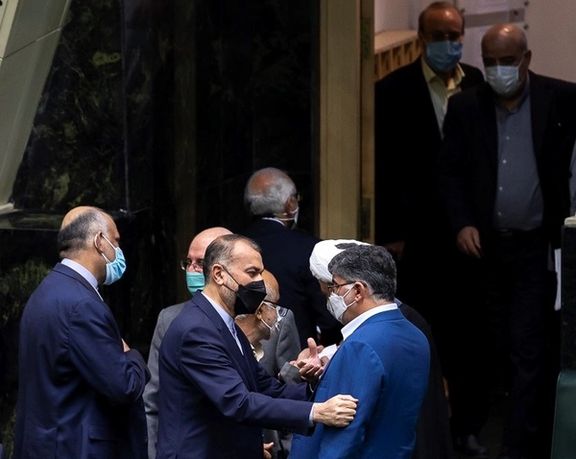
Iran’s Foreign Minister Hossein Amir-Abdollahian attended parliament on Wednesday to reassure lawmakers that so far, no direct talks have taken place with the United States.

Iran’s Foreign Minister Hossein Amir-Abdollahian attended parliament on Wednesday to reassure lawmakers that so far, no direct talks have taken place with the United States.
The possibility of direct talks between Washington and Tehran has been a daily subject of media reports and speculations, as Iranian officials have changed their tone from past categoric rejections.
Mahmoud Abbaszadeh Meshkini, the spokesman for the National Security and Foreign Policy Committee of the parliament, said that Hossein Amir-Abdollaian attended the committee’s meeting to reassure MPs that no direct dialogue has taken place between the Iranian and US negotiating teams so far.
According to Meshkini, the foreign minister also answered questions about the ongoing talks to revive the 2015 nuclear deal, emphasizing that Iran is focused on the issue of guarantees and verifications for the removal of sanctions.
Amir-Abdollaian told lawmakers that some progress has been made but there are still issues that need to be discussed further.
Meshkini said that the West seeks to get concessions from Iran but only a win-win agreement is acceptable by the Islamic Republic.
“Iran wants a lasting agreement, and if it is permanent, it will be better”, Meshkini added, noting that the other side wants a temporary deal so they can withdraw from it whenever they want.
Tehran says it will not consider any interim arrangement, but recent reports suggest it is mulling the idea of direct negotiations with Washington.
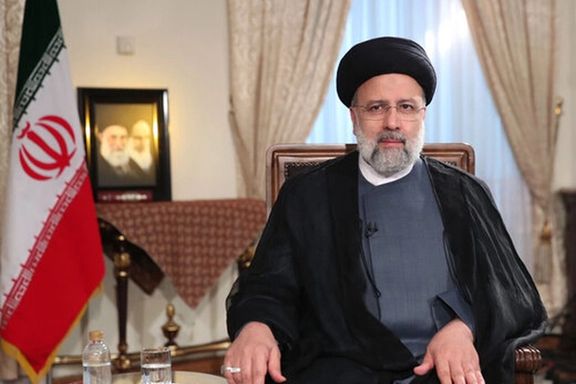
A Press TV misinterpretation unleashed a media storm Tuesday after President Ebrahim Raisi gave a vague reply in a TV interview to a query on direct US talks.
After noting "occasional whispers" over the United States seeking bilateral contact, Raisi, during an hour-long interview broadcast live by state television, was asked for Iran’s response should such a request be made “in a serious manner.”
Such an approach would not be unprecedented, including during times before he took office, Raisi replied. “[Officials of] many countries who meet with us here sometimes bear messages from Americans saying they want to talk with us directly…So far there have been no [direct] negotiations with the Americans. But we have announced before, and say it again, that there will be room, fully, for any kind of agreement, if the other sides are prepared to lift the unjust sanctions against us.”
The interviewer did not press the president over recent remarks by Foreign Minister Hossein Amir-Abdollahian and Ali Shamkhani, Secretary of the Supreme National Security Council, envisaging direct talks. Amir-Abdollahian said Monday that the possibility would not be "overlooked" if a "good deal with strong guarantees" was within reach as part of the Vienna talks seeking to revive the 2015 nuclear agreement, the JCPOA (Joint Comprehensive Plan of Action).
Apparently following an account of Raisi’s interview on the Press TV English-language website, however, a slew of international reports and social media posts claimed the president had made direct talks conditional on the US first lifting sanctions. These apparently prompted Press TV to amend its account of the interview.
Speculation, or tactic?
The confusion was not just abroad. Abdollah Ganji, chief editor of Javan newspaper affiliated with IRGC, tweeted Tuesday that he did not now know whether direct talks with the US were “speculation or a tactic.”
Ganji insisted that Tehran should maintain its stance that Washington should not re-enter the formal Vienna process until it rejoined the JCPOA by withdrawing sanctions introduced since 2018 in violation of the pact. “If it's been decided [that talks with the US are] to happen, [they] should be bilateral…The US presence…[in the formal Vienna talks] means its return to the JCPOA without offering a guarantee to abide by its commitments to it.”
In another tweet Tuesday, Ganji said direct negotiation was a "possibility" that the nezam (‘system’) had always considered possible whenever a positive outcome was expected, “when it was not just talking for the sake of talking." The JCPOA was proceeded by two years of direct US-Iran talks, but Tehran ruled out such bilateral contact when the US left the JCPOA in 2018.
Nezam (system) is a word often used by Iranian politicians to refer to the Supreme Leader Ali Khamenei when mentioning him directly is to be avoided.
Javan newspaper Tuesday splashed a front-page headline, with Amir-Abdollahian's photo: "Direct Talks On Condition of Good Agreement with Strong Guarantees." Many hardliners were skeptical over the JCPOA, or opposed it, and were critical of what they said was the over-reliance on outreach to western Europe and the US of the previous administration of President Hassan Rouhani.

Lebanese Interior Minister Bassam Mawlawi said Tuesday police had thwarted an attempt to smuggle large amounts of Captagon amphetamine pills around the world.
The minister said the drugs were on their way from Lebanon to the African nation of Togo, and from there they would have been sent to a Persian Gulf nation, most likely Saudi Arabia.
There have been many reports of the Lebanese Hezbollah being involved in the production and distribution of Captagon, through third countries to the Gulf Arab states. This has become a major source of income particularly after Lebanon fell into a serious economic crisis in 2019 and US sanctions put financial pressure on Iran, Hezbollah’s main financial backer.
The pills were hidden in 434 boxes, mixed in with seven tons of tea.
They were confiscated at sea after the smugglers sailed from Beirut’s port.
Captagon manufacturing thrives in Lebanon and war-torn Syria, which have become a gateway for the drug to the Middle East, particularly the Gulf.
Smuggling of Captagon pills has been at the heart of a spat between Saudi Arabia and Lebanon, after over five million pills hidden in a shipment of pomegranate from Lebanon were seized in the kingdom in April.
In retaliation, the Saudis banned Lebanese produce from going to or even transiting through the kingdom, a blow to Lebanon’s exporters.
With reporting by AP
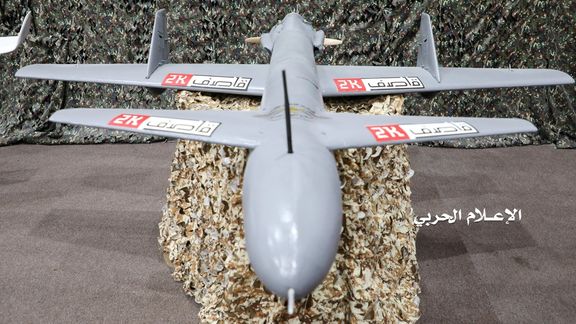
The United Arab Emirates may upgrade its defensive capabilities after missile and drone attacks by Yemen's Iran-backed Houthi group, a senior UAE diplomat said.
The UAE envoy to the United Nations, Lana Nusseibeh, told CNN on Tuesday that UAE intelligence showed the two assaults - the first on the regional commercial and tourism hub - had originated from Yemen, and there was also a need to stem illicit flows of weapons and funds to the group. Houthis had already claimed responsibility for the attacks
The envoy said UAE will also continue diplomacy with Tehran to reduce regional tensions.
A Saudi-led military coalition, which includes the UAE, accuses Iran of supplying the Houthis with arms, which both Tehran and the group deny. United Nations experts have determined that many weapons used by the Houthis have Iranian origin.
Iran has been expanding its military and intelligence presence throughout the Middle East for four decades but setting up a host of allies and militant proxies in the past decade it has created serious tensions with Saudi Arabia, Israel and other regional countries.
Monday's strike, aimed at a base in Abu Dhabi hosting US forces, was thwarted by American-built Patriot interceptors, after a deadly attack a week earlier on the capital.
Nusseibeh confirmed ongoing security discussions with Washington but declined to provide details. The UAE uses the US anti-missile interception system THAAD.
"Our ability to intercept and deflect these attacks is world class," she said. "There can always be upgrades and improvements and... additional intelligence cooperation and I think these are the fields we're looking at with our (U.S.) partners."
The Houthis said they are punishing the UAE for backing forces battling the group in energy-producing regions, after the UAE in 2019 largely distanced itself from Yemen.
She said the UAE, which has urged Washington to reinstate a terrorist designation of the Houthis, was also discussing with partners increasing pressure on the group to engage with stalled UN-led peace efforts. The Biden Administration removed the Iran-backed group from its terror designation immediately after assuming office one year ago, as it aimed to open talks with Tehran to restore the 2015 nuclear agreement.
"That means listing them again on sanctions regimes ... potentially listing additional figures, it means stopping the illicit flow of weapons and finance to them."
The Houthis have repeatedly launched attacks on Saudi Arabia in the war, seen as a proxy conflict between Riyadh and Tehran.
Nusseibeh said the Houthis would not succeed in undermining the UAE's safe-haven status.
The Houthi attacks come as Iran has been promoting a foreign policy aimed at improving relations with regional countries as an antidote to US sanctions that have crippled its economy.
The UAE, which has been engaging with Iran, would continue diplomacy aimed at de-escalation, she said, while reserving the right to defend itself "defensively and offensively" in the Yemen conflict.
With reporting by Reuters
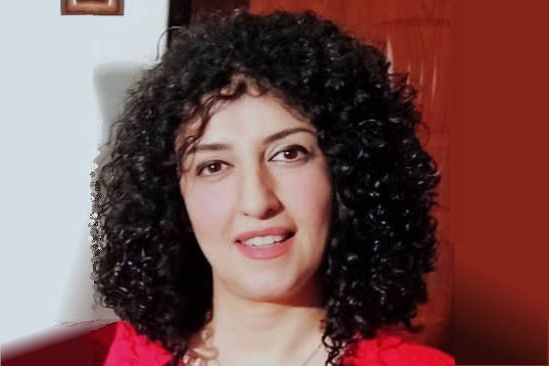
Iranian rights defender Narges Mohammadi said in a letter from prison that a court sentenced her to 8 years because she was nominated for the Nobel Peace Prize.
In her letter from the notorious Gharchak (Qarchak) Prison, obtained by Iran International, Mohammadi who has recently been sentenced to over eight years in jail and 74 lashes, said Branch 26 of the Revolutionary Court in its ruling has stated her nominationby the Norway branch of Amnesty International in March as evidence of her criminality.
"What reveals the hostility and baselessness of the charges [brought against me] and the legal procedure leading to the ruling is that I have been found guilty for being nominated by the Norwegian Amnesty for the Nobel Peace Prize," Mohammadi, a lawyer by profession, wrote in her letter from prison.
Mohammadi also said an official of the intelligence ministry had told her that her nomination was a "foreign conspiracy against the Islamic Republic" while she was still being held at at a special ward of Tehran’s Evin prison, run by the intelligence ministry.
In March 2021, the chairman of Amnesty International in Norway announced that two members of the Norwegian parliament had nominated the Iranian human rights activist for the Nobel Peace Prize, backed by the local Amnesty branch.
"I ask the heads of the Judiciary and Executive, was my nomination … an act against national security of the regime to warrant eight years in prison and 74 lashes and to be held [in solitary confinement] in a cell at the intelligence ministry wing [of Evin Prison] for 64 days?" she wrote.
Mohammadi who is lawyer often defending dissidents, also urged international rights organizations and the members of the European Parliament not to disregard the Islamic Republic's suppression of peace activists.
In her letter, Mohammadi said her trial took place after she spent time in solitary confinement without being allowed to have legal representation, any visits, or even being interrogated. "I was tried within five minutes in the absence of a lawyer and without having read the case files," she said, adding that she chose not to defend herself during the trial as she did not recognize the court’s legality and would not file for appeal.
According to Mohammadi, her sentence also includes a ban on living in Tehran, membership in political and social groups, any social media activities, and even having a mobile phone.
Mohammadi was arrested in November in mid-November at the death anniversary of a citizen, Ebrahim Ketabdar, who was shot dead by security forces during the November 2019 protests.
Mohammadi, who is the vice-president of the Defenders of Human Rights Association, the Chair of the executive board of the Peace Council of Iran, and a member of "Step-by-Step Abolition of Execution" campaign, has been to jail several times over the past two decades.
She was freed from Evin Prison in September 2020 after serving more than five years on trumped up charges, without due process of law. During her imprisonment she was deprived for long periods of any contact with her husband and children who live abroad.
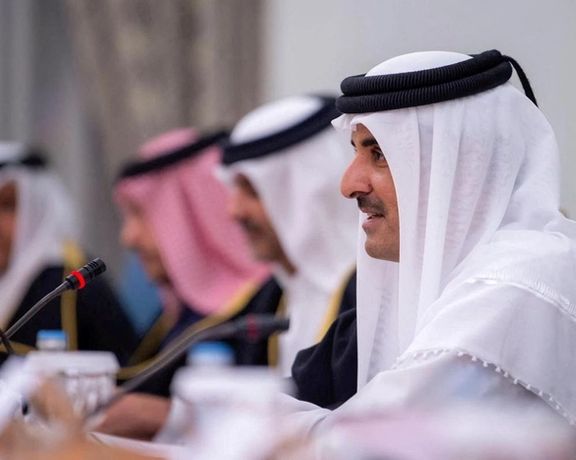
Qatar’s Emir will discuss global energy security and efforts to revive the 2015 Iran nuclear deal with President Joe Biden during his visit to Washington.
Sheikh Tamim bin Hamad al-Thani's visit, the first since Biden took office last year, comes as Washington discusses with energy-producing states and firms a potential diversion of supplies to Europe if Russia invades Ukraine.
Russia that supplies one-third of Europe’s natural gas can stop deliveries amid cold winter months if sanctioned by the West over a possible attack on Ukraine.
Iran's Foreign Minister Hossein Amir-Abdollahian had a telephone conversation with his Qatari counterpart on Tuesday, ahead of Emir's visit to the US.
US Secretary of State Antony Blinken discussed the matter with the foreign minister of Qatar, a top liquefied natural gas producer, in a phone call on Monday, according to a source familiar with the matter who requested anonymity, Reuters reported.
Other issues will include "promoting security and prosperity in the Gulf and the broader Middle East region" and "supporting the people of Afghanistan," White House press secretary Jen Psaki said in a statement.
Qatar has maintained friendly ties with Iran as tensions have remained high in the region. Washington has been trying to reach an agreement with Tehran to revive the Obama-era nuclear agreement, the JCPOA, as Iran is getting dangerously closer to a nuclear breakout point.